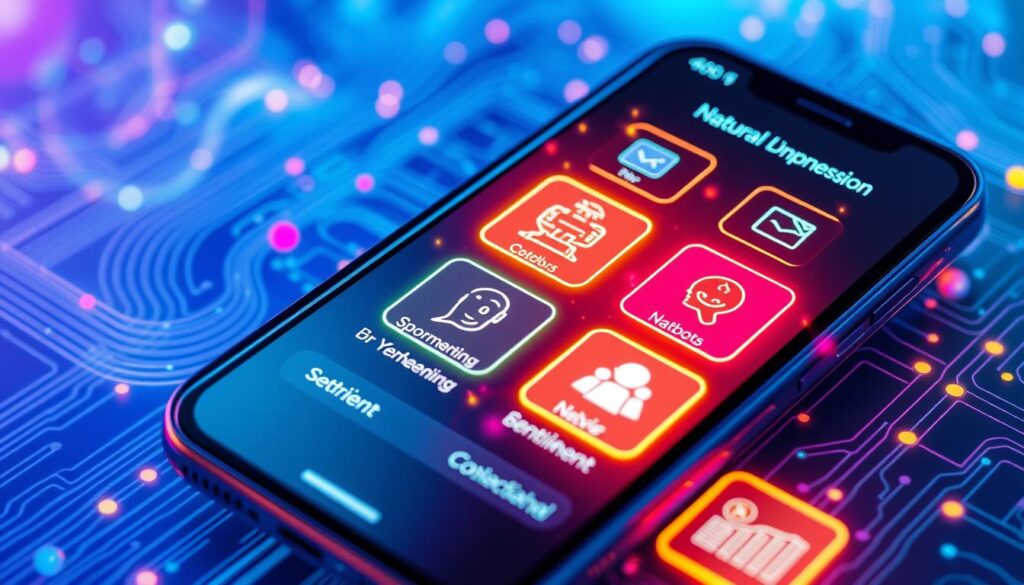In the ever-evolving landscape of technology, the integration of Artificial Intelligence (AI) into mobile app development has emerged as a game-changer. As AI continues to advance, it is significantly impacting the way we design, develop, and interact with mobile applications. From enhancing user experiences to streamlining development processes, the influence of AI on the mobile app industry is undeniable.
As a professional copywriting journalist, I am excited to delve into the profound ways AI is reshaping the mobile app development landscape. In this article, we will explore the evolution of mobile app development in the AI era, understand the core concepts and technologies behind this integration, and uncover the transformative applications of AI across various aspects of the app development lifecycle.
Key Takeaways
- AI is revolutionizing the mobile app development industry, driving innovation and enhanced user experiences.
- The integration of AI-powered features, such as machine learning, natural language processing, and predictive analytics, is transforming app functionality and user interactions.
- AI-enhanced mobile apps are offering personalized experiences, improved security, and optimized performance, catering to the evolving needs of users.
- Emerging trends in AI and mobile app development point to a future where intelligent, adaptive, and highly personalized applications become the norm.
- Understanding the core concepts and technologies behind AI-powered mobile app development is crucial for staying ahead of the curve in this rapidly evolving industry.
The Evolution of Mobile App Development in the AI Era
The world of mobile app development has undergone a remarkable transformation in recent years, driven by the remarkable advancements in AI technology. As the integration of machine learning and other AI-powered capabilities becomes increasingly prevalent, the traditional approaches to mobile app development are giving way to more innovative and efficient methods.
Traditional vs AI-Powered Development Approaches
Traditionally, mobile app development relied heavily on manual coding, complex algorithms, and time-consuming testing procedures. However, the rise of AI has revolutionized this landscape, introducing a new era of mobile app development. AI-powered tools and techniques now enable developers to streamline the development process, automate repetitive tasks, and implement intelligent features that enhance the user experience.
Key Milestones in AI Integration
The integration of AI in mobile app development has been a gradual and ongoing process, marked by several significant milestones:
- The emergence of machine learning-driven user interfaces and personalization features, allowing apps to adapt to individual user preferences and behaviors.
- The widespread adoption of natural language processing (NLP) for seamless voice commands, chatbots, and virtual assistants, transforming the way users interact with mobile apps.
- The implementation of predictive analytics and user behavior analysis to enhance app performance, optimize user engagement, and drive business decisions.
- The integration of AI-powered security measures, including biometric authentication and fraud detection systems, to safeguard user data and prevent malicious activities.
As the AI revolution continues to unfold, the future of mobile app development promises even more groundbreaking advancements, transforming the way we interact with and experience mobile technology.
Understanding AI, Mobile App Development: Core Concepts and Technologies
As the AI revolution sweeps through the tech landscape, the world of mobile app development is undergoing a remarkable transformation. At the heart of this shift lies a deep understanding of the core concepts and technologies that power AI-driven mobile applications. Let’s explore these essential building blocks and uncover how they are shaping the future of mobile experiences.
At the core of AI-powered mobile apps is the fundamental concept of natural language processing (NLP). This technology allows mobile applications to interpret, understand, and respond to human language, enabling more intuitive and seamless user interactions. By harnessing the power of NLP, developers can create mobile apps that can comprehend user queries, provide intelligent assistance, and even engage in natural conversations.
Complementing NLP, machine learning (ML) algorithms play a crucial role in enhancing the intelligence and adaptability of mobile applications. These algorithms enable mobile apps to learn from user data, recognize patterns, and make informed decisions, leading to personalized experiences and predictive capabilities. From recommending relevant content to optimizing app performance, ML is the driving force behind the AI-powered revolution in mobile development.
Underlying these core concepts are the advanced neural networks and deep learning frameworks that power the most sophisticated AI-driven mobile apps. These technologies, inspired by the human brain, allow mobile applications to process vast amounts of data, recognize complex patterns, and make intelligent decisions with remarkable accuracy.
The integration of AI in mobile app development is not just about enhancing user experiences; it also opens up new frontiers in areas like computer vision, speech recognition, and predictive analytics. By leveraging these cutting-edge technologies, mobile app developers can create innovative solutions that redefine how users interact with their devices and the digital world around them.
As the AI revolution continues to unfold, the core concepts and technologies that underpin it will play an increasingly vital role in shaping the future of mobile app development. By mastering these fundamental principles, developers can unlock a world of possibilities and deliver mobile experiences that are truly intelligent, responsive, and transformative.
Machine Learning Algorithms in Modern App Development
In the dynamic landscape of mobile app development, Machine Learning (ML) has emerged as a powerful tool, transforming the way we design and deliver applications. By leveraging advanced algorithms, developers can now create intelligent, personalized, and adaptive mobile experiences that cater to the evolving needs of users.
Supervised Learning Applications
Supervised learning, a core ML technique, has found numerous applications in mobile app development. From image recognition for enhanced photo editing features to predictive text input for seamless typing, supervised learning algorithms enable apps to learn from labeled data and make accurate predictions. This approach empowers developers to incorporate intelligent assistants, recommend relevant content, and streamline user interactions.
Unsupervised Learning in Mobile Apps
Unsupervised learning algorithms, on the other hand, excel at uncovering hidden patterns and insights within large datasets. In the context of mobile apps, this technique can be leveraged to segment users, identify behavioral trends, and tailor the user experience accordingly. Unsupervised learning enables apps to adapt and evolve, providing users with personalized recommendations, content suggestions, and even automated task prioritization.
Reinforcement Learning Implementation
- Reinforcement learning, a dynamic ML approach, is making its mark in mobile app development.
- By enabling apps to learn and improve through trial-and-error interactions with users, reinforcement learning algorithms can optimize in-app experiences, enhance user engagement, and drive long-term loyalty.
- From customizing app layouts to personalized reward systems, reinforcement learning empowers mobile apps to become more responsive, intuitive, and user-centric.
As the mobile app landscape continues to evolve, the integration of Machine Learning algorithms is set to revolutionize the way we interact with our devices. By harnessing the power of AI-driven technologies, developers can create applications that are not only more intelligent but also more adaptable to the unique needs and preferences of individual users.
Natural Language Processing: Revolutionizing User Interactions
In the rapidly evolving landscape of mobile app development, Natural Language Processing (NLP) has emerged as a game-changing technology, transforming the way users interact with their favorite applications. As AI continues to make strides, NLP is poised to revolutionize the future of mobile app development, making user interactions more intuitive, efficient, and personalized than ever before.
One of the most prominent NLP applications in mobile apps is voice commands. With NLP-powered voice recognition, users can now issue verbal instructions to their devices, eliminating the need for cumbersome typing or tapping. This feature not only enhances productivity but also caters to the growing demand for hands-free, on-the-go functionality.
Beyond voice commands, NLP also empowers mobile apps to analyze text input with remarkable accuracy. From sentiment analysis to language translation, NLP-driven text processing capabilities enable apps to better understand user intent and provide tailored responses, creating a more seamless and personalized user experience.
As the integration of Natural Language Processing, AI, and Mobile App Development continues to evolve, the future of mobile user interactions holds immense promise. By harnessing the power of these cutting-edge technologies, app developers can create intuitive, user-friendly platforms that truly understand and respond to the needs of their audiences.

From voice-activated assistants to intelligent chatbots, the possibilities are endless. As we move forward, the seamless integration of NLP in mobile app development will redefine the way we interact with our devices, paving the way for a future where technology truly understands and anticipates our needs.
AI-Powered Chatbots and Virtual Assistants in Mobile Apps
In the ever-evolving landscape of mobile app development, the integration of Artificial Intelligence (AI) has become a game-changer. One of the most prominent examples of this transformative technology is the rise of AI-powered chatbots and virtual assistants. These intelligent systems are revolutionizing the way users interact with mobile applications, enhancing engagement, and providing personalized support.
Implementation Strategies
Crafting an effective AI-powered chatbot or virtual assistant within a mobile app requires a strategic approach. Developers must carefully consider the application’s specific needs, user demographics, and the desired level of interaction. By leveraging natural language processing (NLP) and machine learning algorithms, these AI-driven features can understand user intent, respond to queries, and even anticipate user needs.
Best Practices for Chatbot Integration
To ensure the seamless integration of chatbots and virtual assistants in mobile apps, there are several best practices to follow:
- Establish a clear and natural conversational flow, mirroring human-like interactions.
- Personalize the chatbot’s personality and tone to align with the app’s brand and target audience.
- Provide comprehensive and accurate responses, drawing from a robust knowledge base.
- Integrate the chatbot with other app functionalities to enhance user experience.
- Continuously monitor and refine the chatbot’s performance based on user feedback and analytics.
By adopting these strategies and best practices, mobile app developers can unlock the full potential of AI-powered chatbots and virtual assistants, driving increased user engagement, efficient support, and a seamless overall experience.
Intelligent User Interfaces and Personalization
In the ever-evolving world of mobile app development, the integration of Artificial Intelligence (AI) has paved the way for a remarkable transformation. One of the key areas where AI is making a significant impact is in the realm of Intelligent User Interfaces (IUIs) and personalization. These cutting-edge technologies are revolutionizing the way users interact with mobile applications, creating a more engaging and tailored experience.
Adaptive UI designs, powered by AI, are capable of dynamically adjusting the user interface based on individual preferences, device characteristics, and user behavior. Through machine learning algorithms, mobile apps can learn and adapt to users’ unique needs, presenting content and features that are truly personalized. This level of personalization not only enhances user satisfaction but also fosters deeper engagement and loyalty.
Furthermore, AI-driven personalization extends beyond the user interface, enabling mobile apps to deliver tailored content, recommendations, and experiences. By analyzing user preferences, browsing history, and contextual data, these intelligent systems can provide users with the most relevant and valuable information, ultimately improving their overall app experience.
Intelligent User Interfaces and personalization are just the tip of the iceberg when it comes to the transformative power of AI in mobile app development. As the technology continues to evolve, we can expect to see even more innovative and personalized features that cater to the diverse needs and preferences of users across the globe.
In conclusion, the integration of AI in mobile app development has opened up a world of possibilities when it comes to Intelligent User Interfaces and personalization. By leveraging these advanced technologies, app developers can create truly exceptional experiences that captivate and engage users like never before.
Predictive Analytics and User Behavior Analysis
In the ever-evolving world of mobile app development, the integration of Predictive Analytics and user behavior analysis has become a game-changer. This powerful combination of AI and data-driven insights enables developers to craft personalized experiences that resonate with their target audience, driving user engagement and retention.
Data Collection Methods
Collecting and analyzing user data is the foundation for effective Predictive Analytics in mobile apps. Developers leverage a variety of data collection methods, including:
- In-app tracking and monitoring
- Integrating with third-party analytics platforms
- Gathering feedback through surveys and user testing
- Leveraging device sensors and location data
Pattern Recognition Techniques
Once the data is collected, AI-powered pattern recognition techniques come into play, allowing developers to uncover valuable insights about user behavior and preferences. These techniques include:
- Clustering to group users with similar characteristics
- Predictive Modeling to forecast user actions and preferences
- Anomaly Detection to identify and address unusual user behaviors
- Sentiment Analysis to gauge user sentiment and satisfaction
By harnessing the power of Predictive Analytics and user behavior analysis, Mobile App Development teams can create targeted, personalized experiences that keep users engaged and loyal, driving long-term success in the competitive app market.
Voice Recognition and Speech Processing Features
In the era of mobile app development, the integration of voice recognition and speech processing features has become a game-changer. These AI-powered capabilities are revolutionizing the way we interact with our mobile devices, enhancing accessibility and convenience for users.
Voice Assistants, like Siri and Alexa, have become increasingly sophisticated, leveraging advanced AI and natural language processing (NLP) algorithms to understand and respond to user commands with remarkable accuracy. This technology has found its way into mobile app development, enabling users to control various app functions through voice commands.
By incorporating speech-to-text and text-to-speech capabilities, mobile apps can now offer hands-free interaction, allowing users to perform tasks such as setting reminders, sending messages, or searching for information without the need to manually type or navigate the app. This integration of Voice Assistants and AI into mobile app development has significantly improved the user experience, making it more intuitive and seamless.
Moreover, the advancements in speech processing have also enabled mobile apps to provide real-time language translation, facilitating communication across linguistic boundaries. This feature is particularly useful for global users, enhancing the accessibility and inclusivity of mobile applications.
As AI and Voice Assistants continue to evolve, the future of mobile app development promises even more innovative and user-centric features. Developers are constantly exploring new ways to leverage these technologies to create more intelligent, responsive, and personalized mobile experiences.

In conclusion, the integration of voice recognition and speech processing features in mobile apps, powered by AI and Voice Assistants, has transformed the way we interact with our mobile devices. This technology has unlocked new levels of accessibility, convenience, and personalization, paving the way for a more intuitive and efficient mobile user experience.
AI-Enhanced Security and Authentication Methods
In the ever-evolving landscape of mobile app development, security and authentication have become crucial priorities. Fortunately, the integration of AI technology has revolutionized the way we approach these critical aspects of app design. This section explores the transformative impact of AI on security and authentication methods, showcasing how these advancements are reshaping the mobile app industry.
Biometric Authentication
One of the most significant AI-driven innovations in mobile app security is the implementation of biometric authentication. By leveraging advanced machine learning algorithms, apps can now accurately identify and verify users based on their unique physiological characteristics, such as fingerprints, facial features, or iris patterns. This biometric approach not only enhances security but also provides a seamless and convenient user experience, replacing traditional password-based systems.
Fraud Detection Systems
Alongside biometric authentication, AI-powered fraud detection systems have emerged as a crucial safeguard for mobile apps. These intelligent systems analyze user behavior, transaction patterns, and other contextual data to detect and prevent fraudulent activities in real-time. By employing Machine Learning algorithms, fraud detection systems can continuously learn and adapt, making them more effective in identifying and mitigating evolving threats.
The integration of AI in mobile app development has not only enhanced security but also streamlined the user experience, providing a robust and trustworthy platform for mobile app development. As the industry continues to evolve, we can expect to see further advancements in AI-driven security and authentication, ensuring the protection of user data and the overall integrity of mobile applications.
Performance Optimization Through AI
In the rapidly evolving landscape of mobile app development, AI has emerged as a powerful tool for enhancing performance optimization. As AI, Mobile App Development, and Machine Learning converge, developers can now leverage intelligent algorithms to create apps that are not only feature-rich but also highly efficient.
One of the primary benefits of AI in mobile app optimization is its ability to improve app speed. By analyzing user behavior patterns and system resource utilization, AI-powered algorithms can identify and address performance bottlenecks, leading to smoother and more responsive app experiences. This is particularly crucial in today’s fast-paced digital landscape, where users demand instant gratification and seamless interactions.
Moreover, AI can play a pivotal role in reducing battery consumption. Through predictive analytics and intelligent resource management, AI-powered apps can dynamically adjust their behavior to optimize power usage, ensuring longer battery life and a more satisfying user experience.
Beyond speed and battery efficiency, AI-driven performance optimization also extends to the overall efficiency of mobile apps. By leveraging machine learning techniques, developers can create apps that adapt to user preferences, device capabilities, and network conditions, delivering a personalized and optimized experience tailored to each user’s unique needs.
As the integration of AI, Mobile App Development, and Machine Learning continues to deepen, the future of mobile app optimization holds immense promise. Developers who embrace these transformative technologies will be well-positioned to create apps that not only captivate users but also deliver exceptional performance, ultimately driving user loyalty and business success.
The Future of AI in Mobile Applications
As the mobile app landscape continues to evolve, the integration of AI is poised to reshape the industry in groundbreaking ways. From emerging trends to potential innovations, the role of AI in mobile applications is set to reach new heights in the years to come.
Emerging Trends
One of the most significant emerging trends in the realm of AI and mobile apps is the rise of advanced machine learning algorithms. These sophisticated algorithms will enable mobile apps to engage in more intelligent and personalized interactions with users, catering to their unique preferences and behaviors.
Additionally, the integration of natural language processing (NLP) will revolutionize the way users interact with their mobile apps, allowing for more intuitive and conversational experiences. AI-powered chatbots and virtual assistants will become increasingly prevalent, providing seamless support and information at the user’s fingertips.
Potential Innovations
Looking ahead, the potential innovations in the field of AI and mobile app development are both exciting and boundless. Imagine a future where your mobile app can anticipate your needs, offering proactive suggestions and recommendations based on your habits and preferences.
Furthermore, the advancements in predictive analytics and user behavior analysis will enable mobile apps to deliver personalized content and experiences, truly optimizing the user journey. The integration of voice recognition and speech processing features will revolutionize how we interact with our mobile devices, opening up new avenues for hands-free functionality and accessibility.
As the AI revolution continues to unfold, the mobile app industry is poised for a transformative evolution that will redefine the way we engage with our digital devices. The future is indeed bright for the intersection of AI, mobile app development, and cutting-edge technologies.
Conclusion
Throughout this article, we’ve explored the profound impact that AI is having on the world of mobile app development. From the evolution of traditional approaches to the integration of cutting-edge technologies, the mobile app landscape is being transformed in remarkable ways.
As AI-powered capabilities continue to advance, we’re witnessing a new era of intelligent, personalized, and user-centric mobile applications. From machine learning algorithms to natural language processing, the integration of these AI-driven features is redefining how users interact with and experience their mobile apps.
Looking to the future, the potential for AI to further revolutionize mobile app development is truly exciting. As AI-enhanced security, voice recognition, and predictive analytics become more prevalent, we can expect to see mobile apps that are not only more intuitive and efficient, but also more secure and tailored to individual user needs. By embracing the power of AI, developers and businesses can create mobile experiences that truly set them apart in a highly competitive market.



